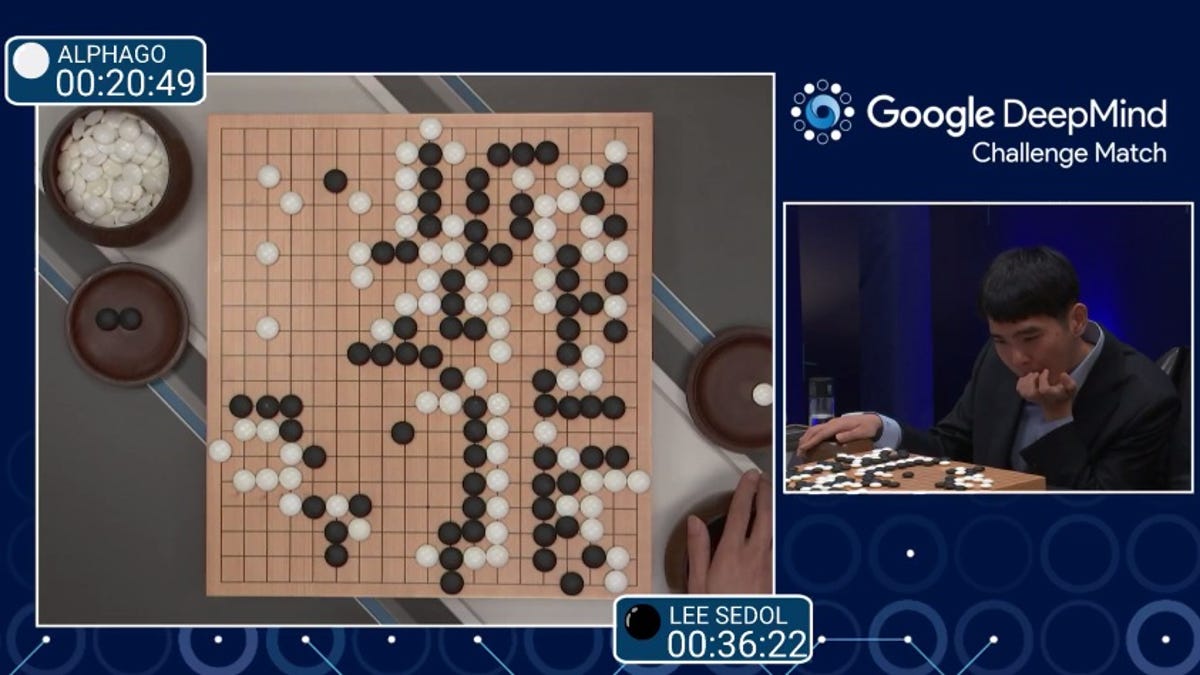Google turns game of Go into massive AI-vs-human spectacle
Tens of thousands of people just tuned into YouTube to watch a computer play the ancient board game Go against a human opponent. It wasn't just for sport. The future of civilization could be at stake.
A certain segment of the world believes the apocalypse will come with explosions, bravado and full camouflage. But the rise of the machines is actually playing out in the Four Seasons Hotel in Seoul, and it's led by possibly two of the nerdiest groups known to humanity.
The drama is all about Go, the ancient and complex board game long thought to be one of the stiffest challenges for computers in their march toward supremacy on this planet.
Wednesday brought us Match 1 of the Google DeepMind Challenge, pitting artificial intelligence against human smarts in a slow-paced, four-hour battle of strategy, complex algorithms, and black and white tiles. We know what you're thinking: Time to clear your schedule and start gathering the snacks.
If you haven't heard of Go, you're not alone. Largely played in China, Korea and Japan, the ancient board game features two players taking turns to place black and white tiles on a grid, jockeying to occupy more of the board than their opponent.
Think of it as chess over a bigger, monochromatic battlefield. Of course, Go players likely don't see it that way. This is the game for people who think chess is too easy (and probably too newfangled).
The AI program, dubbed AlphaGo, was designed by Google DeepMind, the artificial intelligence arm of everyone's favorite (don't be) evil overlords. AlphaGo has been programmed to clear one of the longest-standing AI hurdles: winning at board games. Go's 19x19 grid offers nearly uncountable variations of moves and branching outcomes, ruling out the brute-force logic favored by computers.
We've always known that computers are highly capable machines with a nearly infinite capacity for sorting through vast troves of data -- just think about those lightning-fast Google search results, or the way IBM's Watson supercomputer aced "Jeopardy." But artificial intelligence will eventually go well beyond that. Just now showing up in small doses, such as in Facebook's facial recognition capabilities, it's expected to foster computers that can learn and think for themselves rather than just crunch numbers. And who knows what they'll think of us puny humans.
Yes, that's what worries Stephen Hawking, Bill Gates and Elon Musk. The leader of Tesla Motors and SpaceX, Musk has described AI as "potentially more dangerous than nukes."
But back to our game of Go.
AlphaGo last played back in October, beating pro player Fan Hui. Since then, the machine has had five months to improve its algorithms and, in turn, its strategy, by playing game after game of Go to add to its database of moves. (Don't machines get to have all the fun?)
Leading us through the minefield are commentators Chris Garlock (left) and Michael Redmond.
But now, in a headliner the likes of which hasn't been seen since the Kasparov vs. Deep Blue chess matches, AlphaGo is playing against Lee Sedol.
Fan was a two-dan Go player (because these things are measured in dans), but Lee has nine of nine possible dans to his name and is the No. 2 Go player in the world.
Wednesday's match is the first of five, which will be live-streamed over the coming days. And with more than 80,000 people tuning into YouTube's gaming channel to watch the action, we can only assume the thrills will keep coming.
In the final moments of Match 1 (yes, we watched all the way to the end), AlphaGo claimed victory when its human opponent resigned.
"AlphaGo won. You saw it here," said commentator Chris Garlock. "Right off the bat -- the first game, and AlphaGo takes down Lee Sedol."
Undoubtedly the best part of the action was the vivid commentary from Garlock, managing editor of the American Go E-Journal, and Michael Redmond, a professional Go player or a "Go Pro." The hot takes came thick and fast in a room that Garlock described as "fairly electric" while watching the "Roger Federer of the Go world" take on a brilliant computer.
On the atmosphere
Garlock: I can guarantee there won't be a wasted moment. History is really being made here. Can we guarantee that?
Redmond: I think so.
On the start of proceedings
Redmond: It's very exciting. Just one move so far.
On the battle between man and machine
Garlock: The machine is not going to get tired. He's not going to get intimidated.
Redmond: Pretty much everyone gets intimidated when they go up against Lee Sedol.
On strategy at the start of a Go game
Redmond: He said he had a weak opening...
Garlock: I wish I had his weak opening!
The atmosphere after three hours...
Garlock: I think it's really lived up to its billing as a tremendously historic and exciting game!
At the end of all this, there is $1 million in prize money up for grabs, which Google says it will donate to charity if AlphaGo wins. But as Garlock says, "The real prize is the bragging rights, whether for man or machine."
It's safe to say we'll be tuning into the next game.
Update, 11:35 p.m. PT: Added the results of Match 1.




